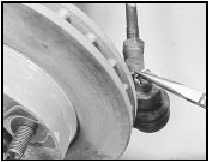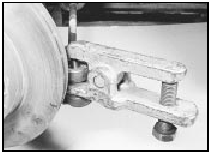Tie-rod end - removal and refitting
Note: A balljoint separator tool will be required for this operation.
Removal
1 Loosen the relevant front roadwheel nuts,
apply the handbrake, jack up the front of the
vehicle and support on axle stands.
2 Remove the roadwheel. On P100 models mark the position of the roadwheel in relation to one of the wheel studs before removal.
3 Make alignment marks on the tie-rod and tie-rod end, then loosen the locknut by a quarter of a turn.
4 Extract the split pin and unscrew the castellated nut (see illustration).

33.4 Extracting the split pin from the tierod balljoint castellated nut
5 Using a balljoint separator tool, release the tie-rod end from the hub carrier (see illustration).

33.5 Using a balljoint separator tool to release the tie-rod end from the hub
carrier
6 Unscrew the tie-rod end from the tie-rod, noting the number of turns necessary to remove it.
Refitting
7 Refitting is a reversal of removal, bearing in
mind the following points.
8 Screw the tie-rod end onto the tie-rod the number of turns noted during removal.
9 Tighten the nuts to the specified torque, and fit a new split pin to the castellated nut.
10 On P100 models, align the previously made marks on the roadwheel and wheel stud.
11 On completion, check and if necessary adjust the front wheel alignment.
See also:
Intercooler - removal and refitting
1985 models
Removal
1 Disconnect the battery negative lead.
2 Remove the air cleaner as described in
Section 2.
3 Remove the intercooler upper and lower air
hoses (see illustration).
22.3 Int ...
Fuses and relays
Fuses
If electrical components in the
vehicle are not working, a fuse may
have blown. Blown fuses are
identified by a broken wire within
the fuse. Check the appropriate
fuses before replacing an ...
Rear hub bearings - renewal
1 Raise and support the rear of the vehicle on
stands (see “Jacking and Vehicle Support”).
Remove the roadwheel and release the
handbrake.
2 On fuel-injected models and Van versions
undo the reta ...
